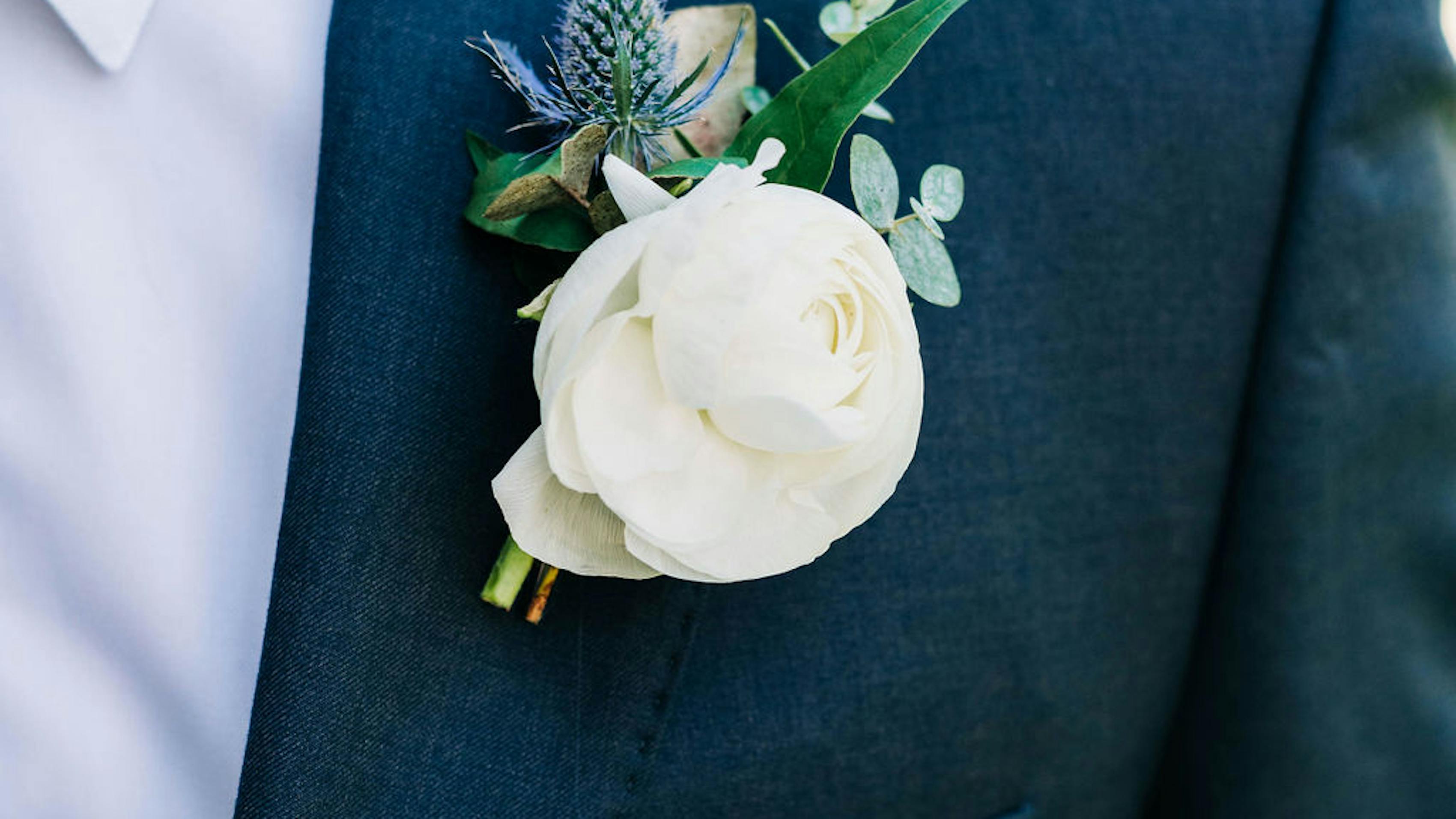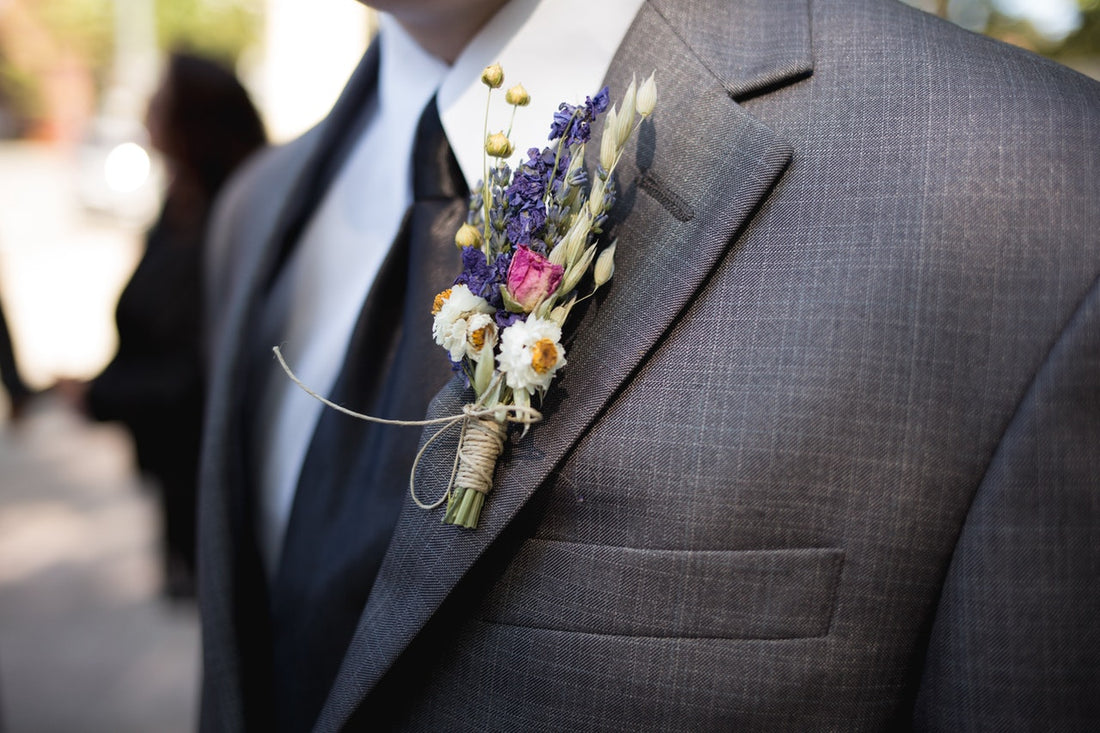What Is a Boutonniere?
A boutonniere is a small floral arrangement worn on the lapel of a suit or tuxedo, most often on the left side, just above the heart. Traditionally worn by men, the boutonniere is secured through the buttonhole or pinned onto the jacket’s lapel. It serves both as a decorative piece and a subtle nod to tradition and occasion.
A Brief History: From Battlefields to Ballrooms

The word boutonniere comes from the French word for buttonhole, and historically, that’s exactly where it was worn. The tradition dates back to the 16th century, when men would wear flowers in their lapels during duels or battles, believing the flower offered protection or symbolized their cause. In Victorian England, the boutonniere became a fashionable accessory among gentlemen to reflect elegance, class, and romantic intentions.
By the 19th century, boutonnieres transitioned into formalwear staples — especially at weddings, military ceremonies, and social balls. Over time, the practice found its home in modern-day celebrations, with boutonnieres now a beloved symbol of style, affection, and artistry.
Symbolism Behind the Boutonniere
More than just decoration, the boutonniere carries rich symbolic meaning. Traditionally, it represents:
-
Love and loyalty — especially in weddings
-
Elegance and sophistication
-
Courage and honor — worn in formal military ceremonies
-
Connection and unity — matching the bride’s bouquet or event’s floral theme
The flower chosen often carries its own symbolism. A red rose signifies passion, while white orchids evoke purity and refinement. Choosing a boutonniere is more than aesthetics — it’s a meaningful expression of personal or shared values.
Modern-Day Relevance and Occasions
Though rooted in tradition, the boutonniere is more relevant than ever. It remains a go-to accessory for a variety of occasions, including:
-
Weddings (groom, groomsmen, fathers of the bride and groom)
-
Proms and homecomings
-
Graduations
-
Black-tie events and galas
-
Memorials and funerals
-
Quinceañeras and other cultural ceremonies
Today’s boutonnieres are more creative and diverse than ever, featuring fresh flowers, dried arrangements, greenery, feathers, pins, and even themed miniatures.
How to Choose the Right Flowers and Colors
Choosing the perfect boutonniere is both an art and a strategy. Consider these key elements:
🎨 Color Coordination
-
Match or complement the event’s color scheme (e.g., tie in with the bride’s bouquet or wedding palette).
-
For contrast, use complementary colors to make the boutonniere pop (like a deep burgundy rose on a navy blue suit).
🌸 Flower Choice
-
Roses – timeless, romantic
-
Calla lilies – modern and sleek
-
Carnations – classic, budget-friendly
-
Orchids – elegant and exotic
-
Succulents – trendy and durable
-
Herbs (like rosemary or lavender) – fragrant and symbolic
Tip: Choose hardy flowers that can last the day, especially for warm-weather events.

Matching the Boutonniere with the Outfit or Theme
A boutonniere should never feel like an afterthought. It’s a part of the ensemble and can either highlight or harmonize with the entire look.
👔 Outfit Coordination Tips:
-
A sleek black tux? Try a white rose or classic carnation for timeless elegance.
-
Navy or grey suits pair well with pastels like blush, peach, or lavender.
-
Rustic weddings? Go for wildflowers, twine wrapping, or dried botanicals.
🌿 Themed Event Tips:
-
Vintage: Add lace, baby’s breath, or antique pins.
-
Beach wedding: Use mini seashells with tropical flowers.
-
Autumn gala: Think orange mums, wheat stalks, and muted tones.
How to Keep Your Boutonniere Fresh All Day
Keeping a boutonniere looking sharp is essential, especially for all-day events like weddings.
🌼 Care Tips:
-
Store it in the fridge before use, wrapped gently in a damp paper towel and plastic bag.
-
Avoid sunlight, heat, and excess moisture.
-
Pin it securely — a loose boutonniere can wilt from too much handling.
Bonus tip: Ask your florist to include a water tube if possible for longer events.
Unique Alternatives and Modern Twists
Boutonnieres have evolved beyond traditional flower buds. Creative minds are crafting some unforgettable pieces:
-
Fabric flowers: For allergy-friendly or keepsake designs.
-
Mini succulents: Long-lasting and trendy.
-
Button or pin boutonnieres: Ideal for quirky or themed weddings.
-
Feathers, berries, or wheat: Rustic, bold, or seasonal.
-
Paper flowers or origami: Eco-friendly and customizable.
Don’t be afraid to personalize your boutonniere — after all, it’s a reflection of your style.
How to Make a DIY Boutonniere: Step-by-Step
Want to create a boutonniere at home? Follow this easy guide:
✂️ Materials:
-
Small flower(s) of choice (e.g., rosebud, spray rose)
-
Filler greenery (baby’s breath, eucalyptus)
-
Floral wire
-
Floral tape
-
Ribbon (optional)
-
Scissors or garden shears
-
Safety pin
🛠 Instructions:
-
Trim the stems of your flower and greenery to about 2–3 inches.
-
Wrap the stem with floral wire to strengthen it.
-
Add filler greenery around the main flower and secure tightly with floral tape.
-
Wrap the base with ribbon if desired, and tie or glue in place.
-
Store in a cool place until ready to wear.
-
Use a safety pin to secure it on the left lapel.
Voilà! Your custom boutonniere is ready for the spotlight.

🌹 FAQs About Boutonnieres
Q1: What is a boutonniere?
A boutonniere is a small floral arrangement worn on the lapel of a suit or tuxedo, typically by men for formal events such as weddings, proms, or galas.
Q2: On which side do you wear a boutonniere?
Traditionally, a boutonniere is worn on the left lapel, just above the heart.
Q3: Can women wear boutonnieres?
Yes! While traditionally worn by men, women can wear smaller versions as hairpins, corsage accents, or tucked into their outfits.
Q4: How far in advance should I order a boutonniere?
It’s best to order 2–3 weeks before the event to ensure availability and freshness, especially during wedding or prom season.
Q5: How do I keep my boutonniere fresh all day?
Keep it refrigerated, wrapped in a damp paper towel inside a plastic bag. Avoid heat and sunlight.
Q6: Can I make my own boutonniere?
Absolutely! With the right materials like floral wire, tape, and fresh or faux flowers, it’s a fun and meaningful DIY project.
Q7: Are fake boutonnieres acceptable?
Yes. High-quality silk or dried flower boutonnieres are elegant and great for long-lasting keepsakes or allergy-friendly solutions.
Final Thoughts
A boutonniere may be small, but it has the power to elevate your entire look and connect you to the moment in a meaningful way. Whether it’s hand-crafted at home, designed by a florist, or creatively reimagined, the boutonniere is a timeless expression of elegance, intention, and personal flair.
So next time you’re getting dressed for a special occasion, don’t forget that final flourish. The right boutonniere doesn’t just complete your outfit — it tells a story.
